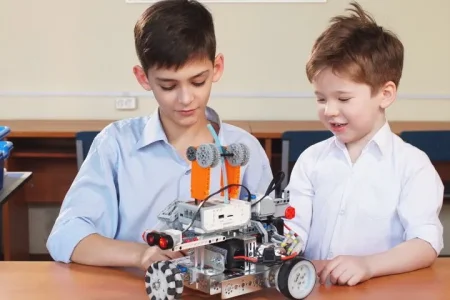A new Polymorphic Packaging System called MPS was developed by the Robotics team of the 4th Primary School of Voula and has already made the first package transfer.
The team, which consists of sixth grade students and is led by their teachers Makis Triantafyllidis and Antonis Skellas, aspires to change the way people pack their products to transport them, in the context of green and circular economy.
MPS consists of facets and tops, which create, easily and quickly, various sizes of packages. The material of the bearings is made of light wood, while the tops are printable by 3D Printer. The packaging is secured in a smart way providing greater security during transportation. As the packages have the shape of a geometric solid, they can be easily stacked, stored and transported.
The school team participates in a robotics research and innovation competition on “Cargo Connect“. In this context, they were called upon to find solutions to make transport safer, faster, cheaper and more efficient. After months of research, the team decided to deal with the issue of packaging used for the transport of items and products in general.
According to their estimates, in Greece at least 600,000 tons of paper end up in the trash every year, which needed 24 million acres of forest (as much as the area of Crete), 200 million cubic meters of water (as much as the consumption of Attica for 200 days) and 3-3.5 billion kilowatt-hours (as much as the energy consumed in four months in Athens).
The pulp and paper industry is the largest industrial consumer of water in developed countries. It is estimated that it takes five liters of water to create a sheet of paper. More than half of the paper produced worldwide is intended to be converted into shipping box packages, cardboard postal packages, wrappers and other paper-based packaging.
With this in mind and based on the daily observation of the habits of sending and receiving packages, as well as a questionnaire used by the team, a solution with economic and environmental benefit was sought. Taking also into account the rapid growth of e-commerce due to the pandemic, as well as the consequent huge increase of moving objects, it was found that there is a large unevenness of packaging both in shape and materials.Packaging in various shapes makes it difficult to transport, as they take up more volume resulting in more frequent routes, which means a greater economic and environmental burden.
The new polymorphic MPS system is flexible and customizable, while each packaging can be used for a long time, thus preventing the creation of waste from packaging materials. MPS also provides the possibility of a personalized package, as facets can be made available with various messages (e.g. fragile).
The team has already sent an item packaged with MPS to a structure of the Foundation for Research and Technology-Hellas (FORTH) through the transport company DHL. The recipient received only the contents as the package was disassembled and is already being reused for subsequent shipments.

